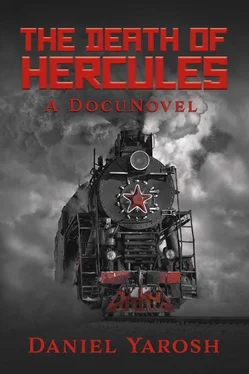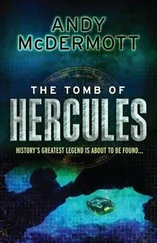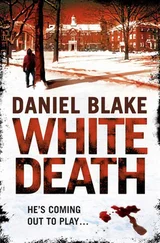“Where in America did you live?” she asked Max.
“I LIVE in Minneapolis, in Minnesota,” he replied with emphasis on the present tense.
“I have not been there. I was in New York. A wonderful place. Such an illusion of freedom. I want to have that here,” she continued.
“It’s not an illusion, its real,” Max countered.
“Don’t be silly,” Marusya said, stomping out her cigarette butt. “Can your women vote? Pfuff …” A long pause followed.
“Why did you come to New York?” Max asked, trying to steer the conversation away from politics.
“I was escaping a death sentence in St. Petersburg, then exile to Siberia,” she said matter-of-factly. Another long pause. “Your accent is from Odessa,” she said.
“Kherson,” Max replied.
“Why did you come back?”
“To rescue my mother and my father.”
Another long pause followed, while Marusya eyed him. “So sweet… They don’t need your rescue. They need you to stay here and fight for them.”
Max sensed the danger in bantering with her. He hung his head down.
“I will check in on the progress with the trucks,” she said, and walked away.
**********
Max soon had repaired two more trucks and three Fiat-Omsky light armored cars captured from the White Army. This steel plated car looked like a large stove on wheels, with a turret on top and two forward facing small-bore machine guns. Together with the trucks, these provided Kotovsky with superior maneuverability and fighting punch. With the train route cut off from the Poles in the west, Kotovsky used the cars for reconnaissance of the southern route and the trucks to deploy troops which outflanked the slowly marching Ukrainian Directorate force. They harassed and ambushed the Ukrainians until they began to desert en masse, some even coming over to Kotovsky’s unit. The Anarchists hardly celebrated Christmas but they did celebrate their military victories. By New Year’s 1919 Proskuriv was abandoned by the Directorate and by February 4, 1919 the Bolsheviks had taken Kyiv to the north.
The mastermind behind this progress was Grigory Kotovsky, but he was hardly the model military leader. He was born in nearby Bessarabia, orphaned at a young age, and studied at the local agricultural college. Like many in his generation, he joined the home-grown Socialist Revolutionaries in 1898. After graduation he took a job as an assistant estate manager, and also took every opportunity to steal from the owners. When he failed to enlist for his required military service he was arrested and conscripted into the Imperial Russian Army. It was not long before he deserted. He was a confidant and commanding figure despite his stutter and organized his own criminal gang. They specialized in violent raids, extortion and robbery, which terrorized the countryside. He served several prison terms, always returning to his gang, until he was granted amnesty by the Tsar on the occasion of the 300th anniversary of the Romanov dynasty in 1913. At the last minute his release was denied, but nevertheless on February 27 he escaped the Katorga penal colony. Once again, he returned to his gang, and organized a spectacular robbery of the State Treasury in Bender, Moldova, just west of Odessa.
Kotovsky then organized one raid too far. He was captured in 1916, imprisoned and sentenced to death by hanging. He composed his finals letters from death row. But then chaos intervened – Tsar Nicholas II abdicated in February 1917. A riot ensued in his Odessa prison and soon the prisoners were running the facility. The Provisional Government granted a broad amnesty, and Grigory Kotovsky walked out a free man. A World War was on, and the best opportunity for violence and thievery now lay within the Anarchist movement. He organized a fighting gang decorated in Anarchist ideology, which liberated them to do and take what they wanted.
The Bolsheviks were uneasy allies of the Anarchists. They both fought for the downfall of the Tsar. They both were not particularly moralistic about their soldiers, and many of the “crimes” for which Kotovsky was convicted looked like revolutionary acts to the Party. Stealing from landowners? Extorting money from the bourgeoise? Dodging service in the Imperial Russian Army? Robbing capitalist institutions? Shooting Tsarist police? No problem. Good training. His unit of Anarchists struck an alliance with the Bolsheviks in late 1918.
Kotovsky seized his new opportunity to squeeze Proskuriv. He created a Revolutionary Council with a few token townspeople, and taxed their meat and bread, of which he personally kept half the take. He exacted revenge on the loyal officials who sided with the Ukrainian nationalist army and harassed his positions, either by ransoming them back to their families or executing them. With his eye on larger prizes, he sent Sholom and Max to examine the train station and any rail stock remaining in town. They went to visit on Saturday, Feb 1, 1919.
For men used to sleeping in tents around campfires, Proskuriv was a metropolis. They walked on a dirt road which became the broad cobblestone Proskurivska Street as they entered town. A light snow covered the buildings like frosting on a cake. The snow on the street had been expertly plowed to the side forming white curbs. On the left side was a sidewalk separated from the street by posts for tying up horse-drawn carriages, which occasionally passed them on their stroll. Men in jackets and women (women!) moved briskly from shop to shop. The center of town was marked by a large two-story red brick building that held the theater under an awning, and a dry goods store. Next to it was a low brown wood store for grain and feedstock, and next to that a two-story hotel of painted white wood with a white balustrade around the second level balcony. More wood storefronts stretched from the theater in the opposite direction. Across from these were two-story brick homes of the wealthy townspeople. In the past year Proskuriv had been ruled by the Tsar, Germans, Ukrainians and now Anarchists. Yet life went on.
Although Max was technically a prisoner and Sholom his guard, the two men walked and talked easily through town. Sholom took up his story after he was demobilized from the French Foreign Legion in late 1917. He and his wife returned to his home in Bender, Ukraine for his recuperation, but he couldn’t keep a domestic life, and working a steady job was not for him. In February 1918 he joined with Anarchist volunteers in Odessa to form the Otriad Rashal brigade, named after a charismatic commander who died too young in a Romanian firefight the previous autumn. Their mission was to defend Tiraspol, west of Odessa, from the Ukrainian nationalists. By May 1918 they fell under attack from the eastward-advancing German and Austrian army, and the overmatched unit fled further east beyond Odessa into the steppes. After their comrade commander died from his wounds, and now without provisions, the group disbanded – every man for himself. Sholom explained that he too smuggled himself onto a train back into Odessa, which was then under German occupation. After careful inquiries among the thieves and murders on the shadowy side of town, Sholom found the Kotovsky brigade and enlisted. By November the Germans had withdrawn and Kotovsky began operating in the open.
“What about your wife?” Max asked after this long narrative.
“Her? I think she is just as happy I am away. After a few months, she understood I could never be her domashniy muzh (house husband). She is probably ashamed of me that I am not a whole man,” he said, shrugging his dead arm. “I send her money when I have enough saved.”
“When is that?” Max asked.
“Never!” and Sholom slapped Max on the back with his good arm.
They walked along Proskurivska Street in good spirits until, a few blocks east of the main building of the town, they reached the train station on their right. The station was empty and in disrepair, reflecting the reduced and dangerous train travel. They looked out through the departure doors. Of the two locomotives that sat on parallel tracks, one was covered in snow, pointed south and clearly out of service. They stepped down from the platform and made their way to the tracks. They almost stumbled over an old man curled up under blankets between the rails. He sat up and blinked his eyes. His white hair was cut short in military style, and covered by a black wool cap. His grizzled white stubby beard suggested he had not shaved recently. Before he could move any further, Sholom drew his pistol with his good right arm and pointed it at the old man’s head.
Читать дальше












